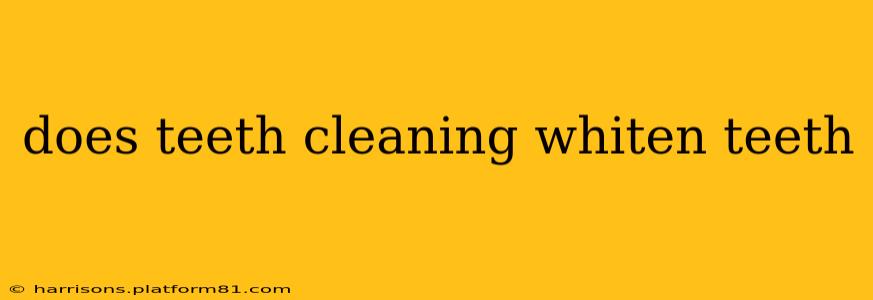Does Teeth Cleaning Whiten Teeth? A Comprehensive Guide
Regular teeth cleaning is a crucial part of maintaining good oral hygiene, but does it actually whiten your teeth? The short answer is: yes, to a certain extent. While professional cleanings won't give you the dramatic results of teeth whitening treatments, they play a significant role in improving the overall appearance of your smile by removing surface stains and revealing a brighter, healthier-looking enamel.
This article will delve deeper into how teeth cleaning contributes to whitening, exploring the different factors involved and addressing common questions surrounding this topic.
How Does Professional Cleaning Whiten Teeth?
Dental hygienists use specialized tools and techniques to remove plaque and tartar buildup from your teeth. This buildup, which accumulates over time, can harbor stain-causing bacteria and contribute to discoloration. The process of removing this buildup effectively reveals a brighter, more natural tooth color. This is particularly effective for extrinsic stains – those that originate from external sources.
Here's a breakdown of the whitening action:
-
Removal of Surface Stains: Professional cleaning uses specialized instruments like ultrasonic scalers and polishing tools to meticulously remove surface stains from coffee, tea, wine, tobacco, and certain foods. These stains sit on the outer layer of your enamel and are easily removed during a cleaning.
-
Polishing for Smooth Enamel: After the removal of plaque and tartar, the teeth are polished to create a smooth enamel surface. This smooth surface is less likely to attract and retain future stains, contributing to the long-term preservation of a whiter smile.
-
Improved Oral Health: Removing plaque and tartar is essential not only for whitening but also for overall oral health. By eliminating these sources of bacteria, you reduce the risk of gum disease and cavities, both of which can negatively impact the appearance of your teeth.
What Types of Stains Won't Be Removed by Cleaning?
It's important to understand that professional cleaning is not a substitute for teeth whitening treatments. While it's effective for surface stains, it won't address intrinsic stains – discoloration that originates within the tooth structure itself. These stains are usually caused by:
-
Medications: Certain medications taken during tooth development can cause discoloration.
-
Trauma: Injury to a tooth can lead to internal discoloration.
-
Age: Natural aging can result in the yellowing of teeth due to the thinning of enamel.
For intrinsic stains, professional teeth whitening treatments like bleaching are usually necessary.
Does Teeth Cleaning Alone Make Teeth Significantly Whiter?
While you'll definitely notice a difference after a professional cleaning, the level of whitening achieved will vary depending on the individual. If your teeth have minimal staining, the results might be quite noticeable. However, if you have significant discoloration from years of staining habits, the improvement might be less dramatic. Think of it as restoring your teeth to their naturally brightest state, rather than achieving a dramatically whiter shade.
How Often Should I Get My Teeth Professionally Cleaned?
To maintain optimal oral health and to help preserve the brightness of your smile, dentists typically recommend professional cleanings every six months. Your dentist may recommend more frequent cleanings depending on your individual needs and oral health status.
Can I Whiten My Teeth at Home After a Professional Cleaning?
Absolutely! A professional cleaning provides the ideal starting point for at-home whitening methods. With a clean slate, the effects of whitening strips or toothpaste will be more noticeable and effective. Always follow the instructions provided with your chosen at-home whitening product.
In conclusion, while professional teeth cleaning might not give you Hollywood-white teeth, it significantly contributes to a brighter, healthier smile by removing surface stains and restoring the natural brightness of your enamel. Combining regular professional cleanings with good oral hygiene habits and, if necessary, professional whitening treatments, can help you achieve and maintain the smile you desire.
